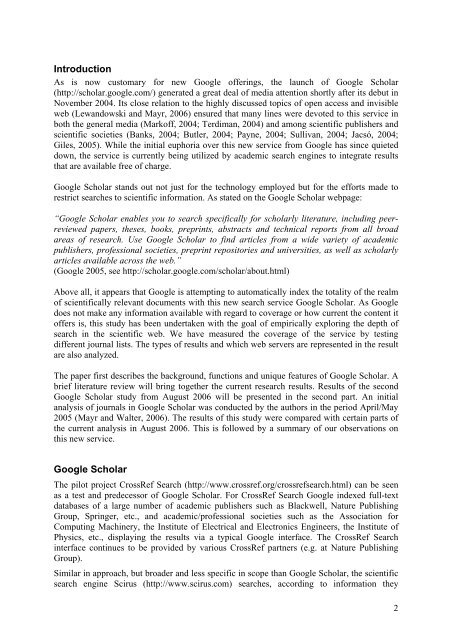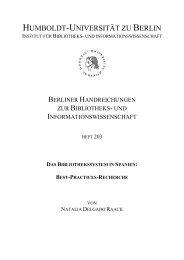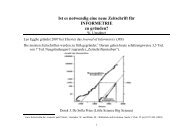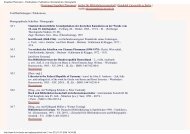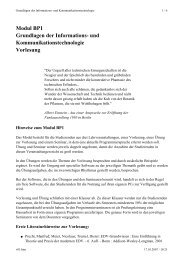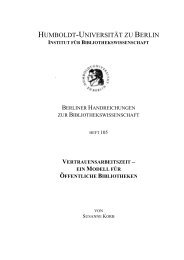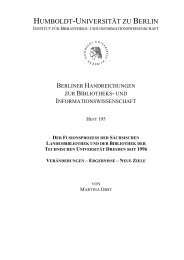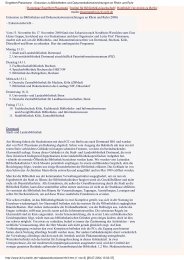An exploratory study of Google Scholar
An exploratory study of Google Scholar
An exploratory study of Google Scholar
Create successful ePaper yourself
Turn your PDF publications into a flip-book with our unique Google optimized e-Paper software.
Introduction<br />
As is now customary for new <strong>Google</strong> <strong>of</strong>ferings, the launch <strong>of</strong> <strong>Google</strong> <strong>Scholar</strong><br />
(http://scholar.google.com/) generated a great deal <strong>of</strong> media attention shortly after its debut in<br />
November 2004. Its close relation to the highly discussed topics <strong>of</strong> open access and invisible<br />
web (Lewandowski and Mayr, 2006) ensured that many lines were devoted to this service in<br />
both the general media (Mark<strong>of</strong>f, 2004; Terdiman, 2004) and among scientific publishers and<br />
scientific societies (Banks, 2004; Butler, 2004; Payne, 2004; Sullivan, 2004; Jacsó, 2004;<br />
Giles, 2005). While the initial euphoria over this new service from <strong>Google</strong> has since quieted<br />
down, the service is currently being utilized by academic search engines to integrate results<br />
that are available free <strong>of</strong> charge.<br />
<strong>Google</strong> <strong>Scholar</strong> stands out not just for the technology employed but for the efforts made to<br />
restrict searches to scientific information. As stated on the <strong>Google</strong> <strong>Scholar</strong> webpage:<br />
“<strong>Google</strong> <strong>Scholar</strong> enables you to search specifically for scholarly literature, including peerreviewed<br />
papers, theses, books, preprints, abstracts and technical reports from all broad<br />
areas <strong>of</strong> research. Use <strong>Google</strong> <strong>Scholar</strong> to find articles from a wide variety <strong>of</strong> academic<br />
publishers, pr<strong>of</strong>essional societies, preprint repositories and universities, as well as scholarly<br />
articles available across the web.”<br />
(<strong>Google</strong> 2005, see http://scholar.google.com/scholar/about.html)<br />
Above all, it appears that <strong>Google</strong> is attempting to automatically index the totality <strong>of</strong> the realm<br />
<strong>of</strong> scientifically relevant documents with this new search service <strong>Google</strong> <strong>Scholar</strong>. As <strong>Google</strong><br />
does not make any information available with regard to coverage or how current the content it<br />
<strong>of</strong>fers is, this <strong>study</strong> has been undertaken with the goal <strong>of</strong> empirically exploring the depth <strong>of</strong><br />
search in the scientific web. We have measured the coverage <strong>of</strong> the service by testing<br />
different journal lists. The types <strong>of</strong> results and which web servers are represented in the result<br />
are also analyzed.<br />
The paper first describes the background, functions and unique features <strong>of</strong> <strong>Google</strong> <strong>Scholar</strong>. A<br />
brief literature review will bring together the current research results. Results <strong>of</strong> the second<br />
<strong>Google</strong> <strong>Scholar</strong> <strong>study</strong> from August 2006 will be presented in the second part. <strong>An</strong> initial<br />
analysis <strong>of</strong> journals in <strong>Google</strong> <strong>Scholar</strong> was conducted by the authors in the period April/May<br />
2005 (Mayr and Walter, 2006). The results <strong>of</strong> this <strong>study</strong> were compared with certain parts <strong>of</strong><br />
the current analysis in August 2006. This is followed by a summary <strong>of</strong> our observations on<br />
this new service.<br />
<strong>Google</strong> <strong>Scholar</strong><br />
The pilot project CrossRef Search (http://www.crossref.org/crossrefsearch.html) can be seen<br />
as a test and predecessor <strong>of</strong> <strong>Google</strong> <strong>Scholar</strong>. For CrossRef Search <strong>Google</strong> indexed full-text<br />
databases <strong>of</strong> a large number <strong>of</strong> academic publishers such as Blackwell, Nature Publishing<br />
Group, Springer, etc., and academic/pr<strong>of</strong>essional societies such as the Association for<br />
Computing Machinery, the Institute <strong>of</strong> Electrical and Electronics Engineers, the Institute <strong>of</strong><br />
Physics, etc., displaying the results via a typical <strong>Google</strong> interface. The CrossRef Search<br />
interface continues to be provided by various CrossRef partners (e.g. at Nature Publishing<br />
Group).<br />
Similar in approach, but broader and less specific in scope than <strong>Google</strong> <strong>Scholar</strong>, the scientific<br />
search engine Scirus (http://www.scirus.com) searches, according to information they<br />
2


